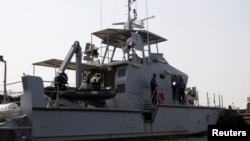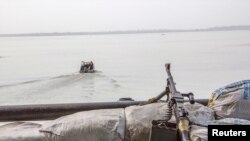West African pirates have turned to hostage-taking as regional navies grow more effective at responding to their crimes, a report from an anti-piracy group said on Tuesday.
The Gulf of Guinea has become the world’s most dangerous body of water, with pirates carrying out 54 attacks in its waters last year and causing over $700 million in economic damage, according to the report from U.S.-based Oceans Beyond Piracy.
Those pirates appear to be changing tactics as navies grow better at apprehending them.
“In the past, one of the primary models of Gulf of Guinea piracy was hijacking for cargo theft,” said Matthew Walje, a lead author of the report.
But with navies responding more and more quickly to attacks, pirates can no longer spend days looting hijacked ships.
“They’ve had to shift towards a faster attack model and kidnap for ransom doesn’t require as much time in order to do that,” Walje said.
Piracy has been decreasing globally, and has virtually stopped in the Gulf of Aden, where Somali pirates once hijacked dozens of ships per year.
But the the International Maritime Bureau says attacks in the Gulf of Guinea are increasing. Forty-four sailors were abducted in the first three months of 2016, according to an IMB report released last week, and two of three ship hijackings that have happened globally took place in the Gulf of Guinea.
Shipping plays a major role for West African economies like Nigeria, Ghana and Ivory Coast, all of which export commodities like oil and cocoa via their seaports.
Anti-piracy partnerships
The increase in piracy in the waters has attracted the attention of countries like the United States, Britain and France, which have partnered with West African navies to teach them how to better guard their coasts.
That strategy seems to be paying off. Walje pointed to an incident in February where a ship hijacked off Ivory Coast was chased by warships from the U.S., Togo and Ghana, before Nigerian sailors eventually retook it.
“The region has gotten better at responding to these incidents, and it is working between the different nations to do handoffs and to ensure that each of the different maritime security institutions is informed and able to act,” Walje said.
With pirates shifting tactics, sailors are paying the price.
Twenty-three people were killed in piracy incidents last year, the Oceans Beyond Piracy report said. Walje said some sailors who were kidnapped were beaten or subject to mock executions. Most sailors are released only after a ransom is paid.
Nigeria has been at the center of this high-seas crime wave.
Many of the sailors who were kidnapped have been taken to its restive Niger Delta region and the pirates themselves are thought to come from the region.
The Delta has long struggled with crime and kidnapping, along with tensions between local communities and the petroleum companies that pump oil from the region.
President Muhammadu Buhari made shaking up Nigeria’s security services a priority after he took office last year.
Even though piracy jumped in 2015, Walje said those security reforms could make Nigeria’s — and West Africa’s — coasts safer in the future.
“The response is getting better,” he said. “This may be a temporary uptick during a period of transition.”





